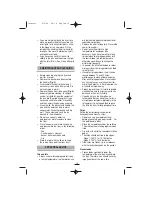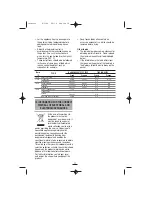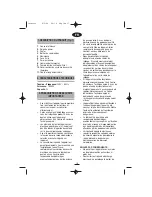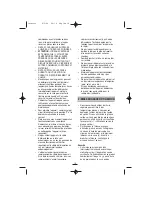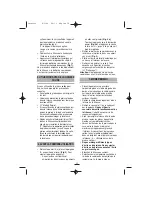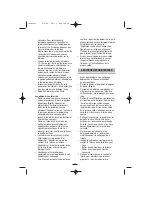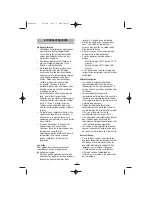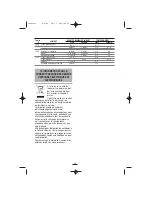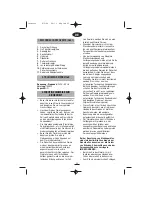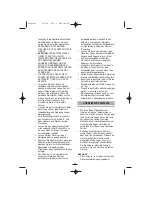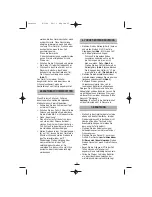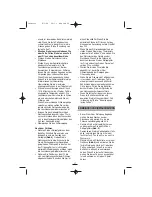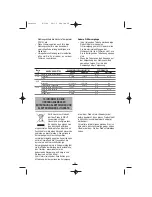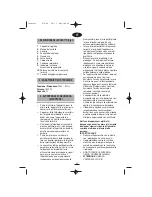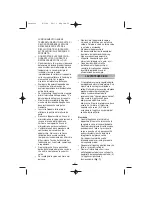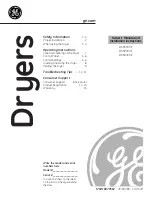
16
8. MAINTENANCE AND CLEANING
•
Before cleaning, unplug the fryer and
wait for it to cool.
•
Remove the basket and disassemble
the handle
(Fig. 5)
•
Disassemble the control panel and if
necessary, clean with a damp cloth. Do
not submerge in water.
•
Remove the pan from its housing
(Fig. 6)
and empty before cleaning. To remove
used oil or liquid fat, pour the contents of
the pan into the original recipient. If you
have used solid fat, wait for it to solidify
and then empty the pan using a spatula.
•
Clean the lid, the basket and handle, the
pan and the outer housing in warm
soapy water. Rinse thoroughly and dry
well. These elements can also be
washed in the dishwasher.
•
Do not use solvents, abrasive
detergents or metal scourers to clean
the fryer.
•
Place the power cable into its housing
and reassemble the fryer in the following
order:
- Pan
- Control panel + element
- Basket with mounted handle
- Lid
•
Store the fryer with the lid on to keep
the inside clean and free from dust.
9. PRACTICAL ADVICE
•
If you are not going to use the fryer for a
while, we recommend that you store the
oil or liquid fat in airtight recipients, either
in the fridge or in a cool place. Fill the
recipients by straining the oil or liquid fat
through a fine sieve to eliminate any left-
over particles of food.
•
If you have used solid fat, leave it to
solidify in the pan and then store the fryer
with the fat still in it. (See ‘Using with solid
fat’).
Oils and fats
•
Always use oils/fats appropriate for frying
at a high temperature. In other words, use
oils that contain polyunsaturated acids or
vegetable margarines.
•
Replace the oil or fat regularly. Never add
new oil to used oil.
•
Do not leave the oil/fat at a high
temperature for any longer than
necessary. If you have to wait for a long
time between two frying operations, turn
the control knob to a low temperature,
otherwise you will have to change the
oil/fat more frequently.
•
In general, the oil/fat will darken in colour
more quickly when frying protein-rich food
(meat or fish).
•
If used for frying potatoes, the oil can be
reused between 10 and 12 times,
providing you remove all loose particles
after each frying operation. Never, under
any circumstances, use the same oil for
more than 6 months. After this period, the
oil should be thrown away.
•
Always replace the oil if it starts to bubble
when heated, smells or tastes rancid, has
darkened or has lost its fluidity.
•
If you do not use the fryer often, we
recommend that you keep the oil or fat in
air-tight glass recipients, preferably in the
refrigerator. It is not a good idea to leave
the oil in the fryer for long periods of time.
Chips
Follow the instructions given below for
flavoursome and crunchy chips:
•
Do not use very new potatoes (new
potatoes generally give poor results). Cut
the potatoes into sticks.
•
Rinse the cut potatoes under the cold tap.
This will stop them sticking together when
fried.
•
Dry with a clean cloth or absorbent kitchen
paper.
•
The chips should be fried in two stages:
- Stage 1: 160º C for 10-15 minutes.
- Stage 2: 190º C for 5-8 minutes.
•
If the chips are frozen, fry in accordance
with the instructions given on the packet.
Frozen foods
•
Frozen foods significantly lower the
temperature of the oil when inserted into
the pan. Therefore, you should never fry
large quantities at the same time.
interior 8/3/06 09:10 Página 15















